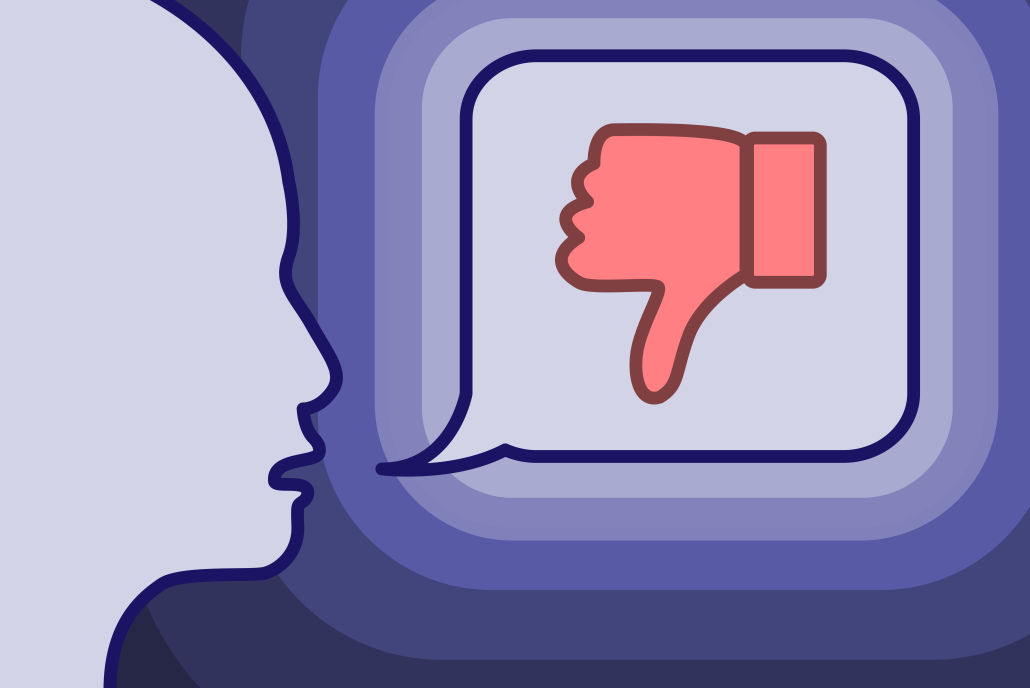CHRONICALLY ONLINE
Sometimes, it’s not wrong to be a hater
Voicing unpopular opinions can sometimes be mischaracterized as hate, preventing the acknowledgment of offensive content.
Voicing unpopular opinions can sometimes be mischaracterized as hate, preventing the acknowledgment of offensive content.


I don’t like the word “hate.” The vengefulness the word connotes and the loathing it synonymizes has ever compelled me to, well, hate it. By definition, being a hater means “to dislike intensely or passionately.” But today, in our online world, that definition is changing. Forget actual hatred — all you need to be a hater is an unconventional idea sprinkled with a differing opinion.
Recently, constructive criticism and pointing out legitimate issues in media have been mischaracterized as hate. Disliking something popular because of problematic themes should not produce the label of being a hater.
For example, when “It Ends with Us” by Colleen Hoover was climbing the best-seller list, many pointed out concerning themes within the book. In return, they were called haters.
Many had the perspective that the book glorified domestic violence and toxic relationships — a valid criticism. Yet, it had many fans of the book fuming and racing to their respective social media sites to characterize the people who were negatively affected by the book as haters.
This unfair label causes important voices to be shut down. Issues are not taken seriously because they fall under the bracket of hate. This results in an entirely homogeneous view of a subject, because the voices with differing opinions that identify real issues may no longer speak out for fear of being labeled a hater.
Saying a film lacks diversity or a comment made on a TV show is racist is not grounds to be called a hater. Instead, these issues need to be recognized and voiced.
One such film is “Poor Things” (2023), which tells the story of Bella Baxter (Emma Stone), who is resuscitated after her suicide. The movie has been a point of contention among many, as some viewers explain the movie made them feel uncomfortable, because the protagonist has the brain of a child but is still highly sexualized.
However, comments about how these arguments are not valid came flooding through, highlighting the movie’s cinematography and societal commentary but ignoring how the movie can still cause uneasy feelings.
People are allowed to dislike art and media: It is simply about personal preferences. Expressing an opinion, even if it doesn’t align with the majority, is also vital so long as it is respectful. The internet provides a space for those with differing views, and we all have the right to voice them.
When people began criticizing the overconsumption of Stanley Cups, they were labeled contrarians. However, the argument TikTok user @DestineeMoreh had was that the entire point of buying a reusable water bottle is negated by purchasing an excess amount of them.
While many in the comments agreed with her, some users dismissed the creator’s point entirely. Another creator had to apologize before stating her perspective on how harmful overconsumption could be.
This is not an endorsement of making hate lists a mile long or hiding behind a screen while posting mean comments. Hating just to hate is a projection of insecurities and can lead to vicious forms of cyberbullying. This is not something in which we should ever be engaged.
However, the mischaracterization of hate is something inherently harmful, because it shuts down communities negatively affected by media. Our different experiences and perspectives allow us to view media differently, which allows us to point out flaws that others may not notice. This prevents accountability and change and will only continue perpetuating a cycle of harm, because the issues will never be addressed.
If this is the new definition of being a hater, then you should be one. Speak your mind, especially when something is problematic — as long as it is respectfully done. Important voices and perspectives that point out relevant issues should not be shut down in the name of hate.
Amrita Vora is a sophomore writing about the impact of social media on adolescents and college students. Her column, “Chronically Online,” runs every other Monday.
We are the only independent newspaper here at USC, run at every level by students. That means we aren’t tied down by any other interests but those of readers like you: the students, faculty, staff and South Central residents that together make up the USC community.
Independence is a double-edged sword: We have a unique lens into the University’s actions and policies, and can hold powerful figures accountable when others cannot. But that also means our budget is severely limited. We’re already spread thin as we compensate the writers, photographers, artists, designers and editors whose incredible work you see in our daily paper; as we work to revamp and expand our digital presence, we now have additional staff making podcasts, videos, webpages, our first ever magazine and social media content, who are at risk of being unable to receive the support they deserve.
We are therefore indebted to readers like you, who, by supporting us, help keep our paper daily (we are the only remaining college paper on the West Coast that prints every single weekday), independent, free and widely accessible.
Please consider supporting us. Even $1 goes a long way in supporting our work; if you are able, you can also support us with monthly, or even annual, donations. Thank you.
This site uses cookies. By continuing to browse the site, you are agreeing to our use of cookies.
Accept settingsDo Not AcceptWe may request cookies to be set on your device. We use cookies to let us know when you visit our websites, how you interact with us, to enrich your user experience, and to customize your relationship with our website.
Click on the different category headings to find out more. You can also change some of your preferences. Note that blocking some types of cookies may impact your experience on our websites and the services we are able to offer.
These cookies are strictly necessary to provide you with services available through our website and to use some of its features.
Because these cookies are strictly necessary to deliver the website, refusing them will have impact how our site functions. You always can block or delete cookies by changing your browser settings and force blocking all cookies on this website. But this will always prompt you to accept/refuse cookies when revisiting our site.
We fully respect if you want to refuse cookies but to avoid asking you again and again kindly allow us to store a cookie for that. You are free to opt out any time or opt in for other cookies to get a better experience. If you refuse cookies we will remove all set cookies in our domain.
We provide you with a list of stored cookies on your computer in our domain so you can check what we stored. Due to security reasons we are not able to show or modify cookies from other domains. You can check these in your browser security settings.
These cookies collect information that is used either in aggregate form to help us understand how our website is being used or how effective our marketing campaigns are, or to help us customize our website and application for you in order to enhance your experience.
If you do not want that we track your visit to our site you can disable tracking in your browser here:
We also use different external services like Google Webfonts, Google Maps, and external Video providers. Since these providers may collect personal data like your IP address we allow you to block them here. Please be aware that this might heavily reduce the functionality and appearance of our site. Changes will take effect once you reload the page.
Google Webfont Settings:
Google Map Settings:
Google reCaptcha Settings:
Vimeo and Youtube video embeds:
The following cookies are also needed - You can choose if you want to allow them:
